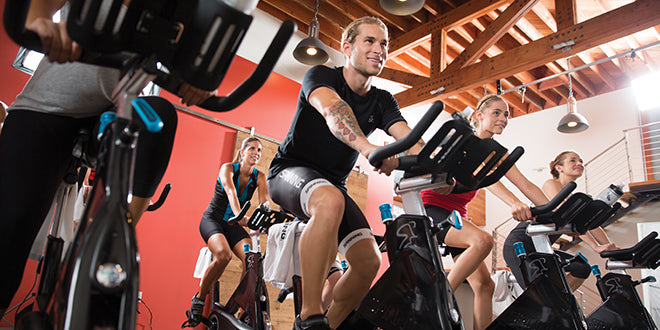By June Chu, Certified Spinning® Instructor | New Hampshire, United States Take the quiz now for 1 SPIN® CECMotivation has been well researched by psychologists and still, as a fitness professional and a psychologist myself, I struggle to teach my students this important life skill.
Why Locus of Control is Important
A distinction made in the field of psychology, as it pertains to motivation, is the idea of “locus of control”—that idea being internal versus external (Rotter, 1965). Simply stated, with an internal locus of control, one believes that they control their own actions. With an external locus of control, one believes that outside forces determine their actions. An internal locus of control is the one in which more committed patterns of behavior can emerge and grow.When it comes to fitness routines, personal wellness and weight loss, we want to instill the power in our students to believe that they chart their own course for success. The focus of our coaching should be on developing and constantly enhancing factors that contribute to a student’s development of their internal locus of control.
Motivating via Locus of Control in Spinning® Class
Coaching phrases that include the student’s actual work linked to successful achievements will encourage a belief in oneself. Telling your student “you can make it up this seven-minute hill because your legs are strong” reinforces the idea that it is within the student’s power to succeed. On the other hand, while a phrase like “you can go faster because we’re riding downhill and gravity is working in your favor” does use the word “you,” it also has a strong external component (going downhill and the force of gravity) attributing to success to more than just the student’s hard work. Notice the difference? While both are encouraging, one emphasizes the pure effort of the individual, while the other does not.But, what if someone doesn't complete it? Don’t let them leave feeling ashamed! A good coach takes the time to meet people new to the Spinning program and instructs them how to work at their own pace to start. And don’t forget to applaud them for taking those first steps by coming to Spinning class!
Motivating via Locus of Control for Accountability in Students
With the increasing obesity epidemic in the United States, weight loss is of grave concern for many students. It is incredibly easy to take an external locus of control view when it comes to why weight loss is so challenging. This reinforces the idea that we are not able to control our eating habits because something else is tempting us all the time—just consider the number of food commercials. So how does one override the external and think about our ability to control what we eat? Instructors may not give nutritional or dietary advice, especially as many of us are not certified to do so. However, we can encourage personal responsibility and accountability for actions, and encourage students to incorporate this into all areas of life.In Spinning class, we can teach students to focus on their own strength and power with phrases like, “You are the person who came to class today and you’re going to get your heart rate up, be stronger and be in charge of your fitness!” Remind students that they themselves took the initiative, that no one forced them there and that their success is a result of their own actions.Granted, for some, the first time they come to a Spinning class might be due to something external—a friend “dragged” them along, they paid that exorbitant fee to the gym while making their New Year’s resolution, etc. But the goal for instructors is to re-shape this external locus of control into an internal locus by the Spinning student knows he or she is in charge of getting themselves to class and can take active control of their health.
Motivating Through Concreteness
Along with the words that you use to motivate a student to take ownership and feel empowered, some individuals need you to be concrete about things they must do. For example, a student may approach you to ask how often they should work out or what
cycling shoes are best. If you do not have the expertise to advise a student, defer that person to an expert—build a network of human resources for them.If they are new to exercising, discuss their performance in their first Spinning class and then recommend the number of times per week they should attend class. If they have approached you, odds are they liked your style, so advise them on the times that you teach (but also encourage them to try other instructors too). Be concrete about which other instructors have similar styles to you, as well as those who are dissimilar, so a student can make a good informed choice about their second class.Walk the student over to a fitness class calendar and point out the classes. Tell them you will look for them at your next class, again, starting with the external locus of control, then gradual encouragement into their internal locus. Once they start coming regularly, they’ll begin to realize they are not coming because you said you would see them soon, but rather because they love their new-found routine.
Empowering People for Success
During the
Spinning Instructor Training, you discussed words and phrases to use for encouraging those you teach. It is important to be mindful of ways in which you can encourage students to think about themselves as taking charge of their fitness. To start with external factors is great—taking those first steps into a fitness facility is never easy for “newbies.” But as instructors, your role will become empowering through positive, motivational coaching that inspires ownership of one’s goals and achievements.Stay motivated by joining our Spinning Community! How does Spinning help you stay motivated? Tell us your story! Contact us at
info@spinning.com and write "Community" in the subject line.
References
Anderson, C., John, O.P., and Keltner, D. (2012). The personal sense of power. Journal of Personality, 80(2), 313-344.Pierce, R.M. Schauble, P.G. and Farkas, A. (1970). Teaching internalization behavior to clients. Psychotherapy: Theory, research and practice, 7(4), 217-220.Rotter, J.B. and Mulry, R.C. (1965). Internal versus external control of reinforcement and decision time. Journal of Personality and Social Psychology, 2(4), 598-604
Take the quiz now for 1 SPIN® CEC






Leave a comment
This site is protected by hCaptcha and the hCaptcha Privacy Policy and Terms of Service apply.